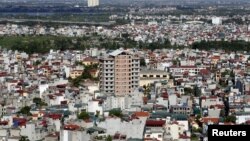When Vietnamese sell houses, the machine they bring along for transactions is used to count money, not swipe credit cards. Property expert Marc Townsend said that’s indicative of Vietnam’s real estate market: people pay with cash, not loans.
Some expect that to change, as Vietnamese real estate opens up to foreigners who are more inclined to get mortgages than fork over cash.
A real estate law that took effect July 1 was supposed to be a game changer, giving foreigners most of the same property rights as Vietnamese. But more than two months out, people haven’t exactly been scooping up condos and villas.
The hesitation is fueled by uncertainty, as foreigners wait to see how officials will implement the new law. In Vietnam, new regulations tend to stir little change until the government publishes guidelines on how to use them. People who work in the property sector say they’re surprised that after two months, those guiding decrees and circulars are nowhere to be seen.
No one wants to be first
“This is a no-man’s land,” said David Blackhall, managing director of VinaCapital Real Estate. He said nobody wants to be the guinea pig to test out the new law.
One source of uncertainty is the transfer of money, especially across borders. The real estate law lets foreigners obtain mortgages, rent out their homes, and hold ownership certificates for 50 years, which can be renewed another 50 years. But if they sell property, it’s unclear how they can send the money back to their own countries.
Anti-money laundering rules have made cross-border transactions notoriously difficult in Vietnam, especially for outgoing transfers. Banks typically require people to prove their source of income and limit transfers to that monthly amount, in addition to other documentation requirements and fees.
Townsend, managing director of CBRE Vietnam, said that when traveling to neighboring places like Tokyo, he’s encountered groups of foreign buyers scouting out opportunities. That isn’t happening in Vietnam.
“We haven’t seen busloads of Chinese,” he said last week at a property seminar run by the Canadian Chamber of Commerce. Townsend said there’s a similar reluctance among foreign real estate developers and investors from Singapore and Hong Kong. “These people haven’t got on the plane yet.”
More reforms needed
More people might come from abroad if Vietnam relaxed some restrictions in the law, according to Le Hoang Chau, chair of the Ho Chi Minh City Real Estate Association.
He said at the seminar that policymakers could incentivize foreigners by giving buyers multi-entry visas for one to three years. The law says anyone with a valid visa to enter Vietnam, even for one day, can buy property.
But a bigger sticking point is the limit on foreign ownership to 30 percent of an apartment building, or 250 houses in a ward.
Chau said the government should leave this to the discretion of local officials because demand varies widely. In Ho Chi Minh City, for example, Districts 2 and 7 are famously saturated with foreigners, as well as Binh Thanh District and District 4.
“We just want to have a level playing field for locals and foreigners,” Chau said.









